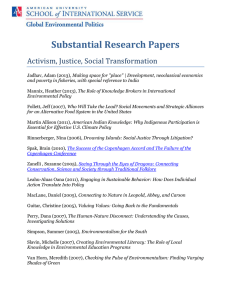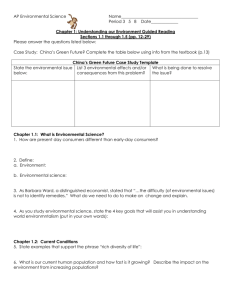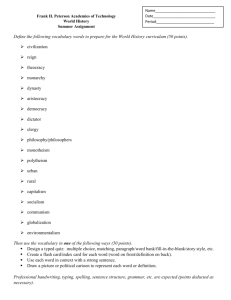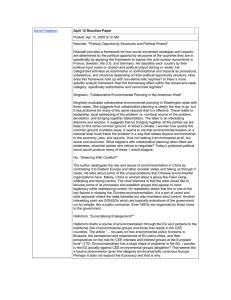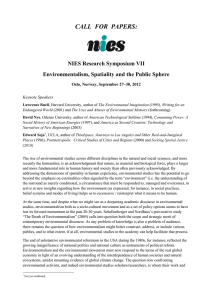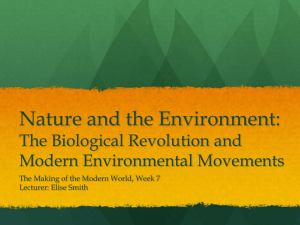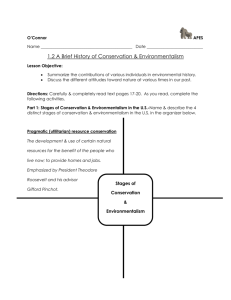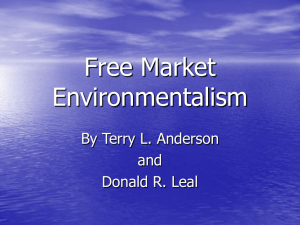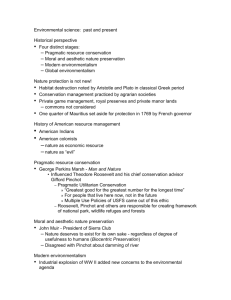environmentalism - University of Leeds
advertisement
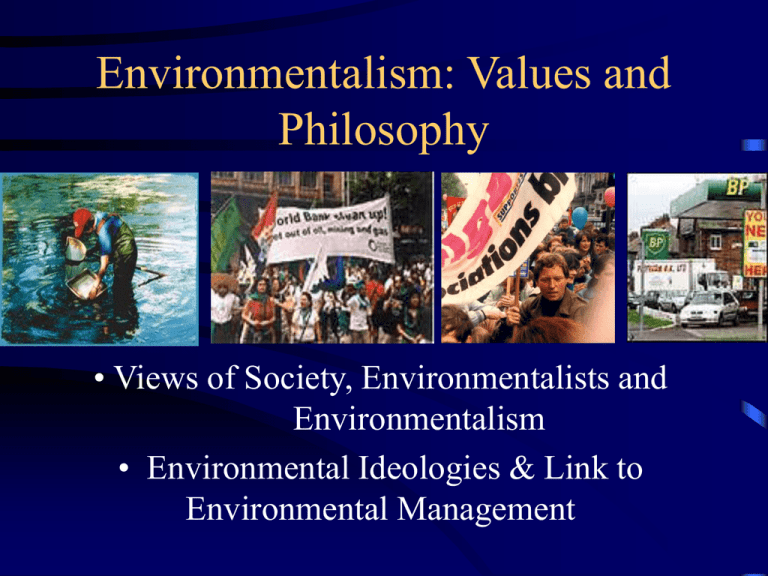
Environmentalism: Values and Philosophy • Views of Society, Environmentalists and Environmentalism • Environmental Ideologies & Link to Environmental Management Session Objectives 1. Understand the different classifications for environmentalism – – Technocentrism Ecocentrism 2. Identify some of the leading environmental thinkers and activists associated with each of the above typologies Views of Society • Society - the social organisation and associated institutions that shape human behaviour • Typically societies have rules of behaviour, division of roles and punishments, dependent on – – – – – – Gender Age Knowledge and skills Control over means of production Place of origin Background • Citizenship - “social and moral responsibility to each other” Societal Rules Many forms of control vital to societal functioning • Religion and creation mythologies • Political Laws - social consensus • Culture, customs and fashions Usually controlled at national level by Institutions State, church, market and business, education, police etc. For individual / communities culture and social values more important Society - Environment Links • How we perceive and behave towards the environment is closely linked to societal norms • Religion – Creation story of one God creating the earth and universe and then humans in his image (Judaism, Christianity & Islam) => Envt to use and exploit – Bhuddism & Hinduism - holistic view that sees humankind as part of, & inseparable from the wider envt - have animal and plant deities and sacred rivers … – Indigenous cultures - often have plant and animal deities and a feeling of ‘belonging’ to the land Indigenous Philosophies & Knowledge • Inter-relationships between different env systems and appreciation of processes central - “an appreciation of the whole” • Now recognised as having great env management potential - offer insights lost due to the split between academic disciplines and the search for ‘objective’ scientific facts Environmentalist/ism • A specialist in the maintenance of ecological balance and the conservation of the environment – Collins Concise English Dictionary Definition • The ‘green’ ideas about the relationship between society and nature – David Pepper, 1996 Many modern environmentalist would prefer to believe that … • The environmental crisis is obvious • Scientific evidence objectively shows this to be the case • Provided enough of us realise this and see the evidence we must and will recognise the need to act differently • Thus avoiding a messy ideological debate Why ideologies are important “Ideologies are sets of ideas that form the basis of a personal or group ‘world view’: a particular perspective on how the world is, and ought to be” Pepper, 1996, p.2. They tell us about a person’s (individual) or an organisation’s (collective) values, ethic, morals, principles, beliefs & thus decisions and actions Task • In groups of 3-4 • Take the environmental issue of biodiversity • List as many reasons as you can for why whales should be saved • Can any of these reasons be classified into themes or typologies? Environmentalism has multiple meanings – Many ways of perceiving humankinds relationship to the planet – Many ways of understanding the problems – Many competing solutions “the environmental issue mean such different things that in aggregate it quite literally encompasses everything” David Harvey Theocentric • God centred argument • Based on Judeo-Christian and Islamic Faiths • Nature and living species are divine creations • The human species has a stewardship duty to protect and respect nature (Genesis 1:26 God grants man dominion ….) Technocentrism • Anthropocentric • Based on scientific reductionism • Human intervention and development can enhance and improve nature • Nature – Is benign ‘capable of quick recovery from human interference’ – Objectified – There to serve human interests – Only has instrumental value Cornucopians • • • • Optimistic faith in human ingenuity Pro-growth (economic) Faith in science and technology Suspicious of widening public participation • Believe the economy will self-correct Environmental Managers • Pro-growth, but interventions necessary to control & compensation the worst excesses • Allowance for wider consultation in decision-making process Ecocentrism • Philosophical roots – Romanticism: Thoreau, Whitman, Ruskin – Eastern thinking: Buddhism, Taoism • Nature – has intrinsic value in its own right – is a community not a commodity – respect the utility and beauty of nature – we should try to live in harmony with the natural world Self-Reliance / Soft Technologies • Bioregionalism, small-scale local solutions • Communitarian; linking of work and leisure • Importance of participation, recognition of minority rights • Appropriate Technology • Materialism for its own sake is wrong Deep Ecology • Bio-ethics • Ecological laws should underpin human morality • Biorights • Distrust of large-scale technology, elites, central state authority • Materialism for its own sake is wrong Task outside of the today’s session • Read in greater depth about some of the individuals that represent the technocentric and ecocentric environmentalism • Begin to understand the beliefs and values that influences the way they frame the environmental crisis and their preferred solutions Key References Gandy, M. (1996) Crumbling land: the Post-modernity Debate and the Analysis of Environmental Problems, Progress in Human Geography, 20(1) pp.23-40. Guha, R. (2000) Environmentalism: A Global History, Longman, New York. Huxham, D. (2000) ‘Why conserve wild species?’ in Huxham, M. and Sumner, D. Science and Environmental Decisionmaking, Prentice-hall, Harlow. O’Riordan, T. (1983) An Annotated Reader in Environmental Planning and Management, Pergamon Press, Oxford. Palmer, J. (2001) Fifty Key Thinkers on the Environment, Routledge, London. Pepper, D. (1996) Modern Environmentalism, Routledge, London.

